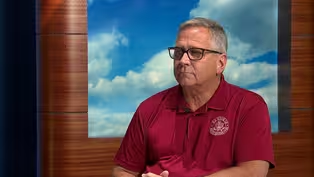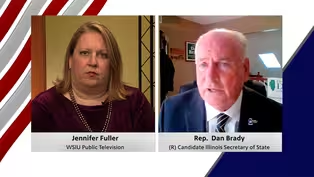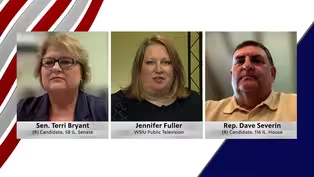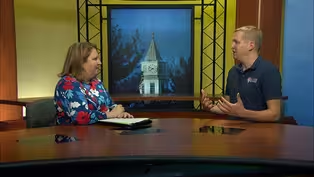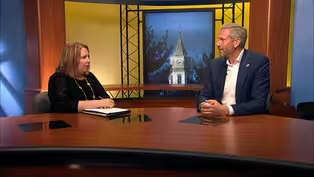Meet the Candidates
12th U.S. Congressional Seat Homer "Chip" Markel
10/13/2022 | 27m 14sVideo has Closed Captions
12th U.S. Congressional Seat Homer "Chip" Markel
Democrat Homer "Chip" Markel discusses the issues from economy to education, health and safety with WSIU’s Jennifer Fuller in this edition of Meet the Candidates.
Problems playing video? | Closed Captioning Feedback
Problems playing video? | Closed Captioning Feedback
Meet the Candidates is a local public television program presented by WSIU
This series is produced in partnership with the League of Women Voters
Meet the Candidates
12th U.S. Congressional Seat Homer "Chip" Markel
10/13/2022 | 27m 14sVideo has Closed Captions
Democrat Homer "Chip" Markel discusses the issues from economy to education, health and safety with WSIU’s Jennifer Fuller in this edition of Meet the Candidates.
Problems playing video? | Closed Captioning Feedback
How to Watch Meet the Candidates
Meet the Candidates is available to stream on pbs.org and the free PBS App, available on iPhone, Apple TV, Android TV, Android smartphones, Amazon Fire TV, Amazon Fire Tablet, Roku, Samsung Smart TV, and Vizio.
Providing Support for PBS.org
Learn Moreabout PBS online sponsorshipMore from This Collection
Meet the Candidates features interviews with candidates running for Illinois State, House and Senate races. Guests will discuss key issues impacting Illinois voters such as the economy, the environment, education and public health. This series is produced in partnership with the League of Women Voters.
12th U.S. Congressional Seat Rep. Mike Bost
Video has Closed Captions
12th U.S. Congressional Seat Rep. Mike Bost (27m 3s)
118th Illinois State House, Rep. Paul Jacobs and Van Ikner
Video has Closed Captions
118th Illinois State House, Rep. Paul Jacobs and Van Ikner (25m 16s)
Illinois Governors Race, J.B. Pritzker
Video has Closed Captions
WSIU’s Jennifer Fuller interviews Democratic Governor JB Pritzker. (26m 27s)
Illinois Secretary of State Race Candidate Dan Brady
Video has Closed Captions
Illinois Secretary of State Race Candidate Dan Brady (26m 46s)
58th Senate and 116th House General Election
Video has Closed Captions
State Sen. Terri Bryant (R-Murphysboro) and State Rep. Dave Severin (R-Benton) (27m 2s)
Illinois Treasurer General Election Tom Demmer
Video has Closed Captions
Sit down with Republican State Representative Tom Demmer. (25m 47s)
Illinois Treasurer General Election Michael Frerichs
Video has Closed Captions
Sit down with Democrat Michael Frerichs, who is seeking re-election. (26m 46s)
115th and 117th IL. House District General Candidate Forum
Video has Closed Captions
115th and 117th IL. House District General Candidate Forum (27m 13s)
Providing Support for PBS.org
Learn Moreabout PBS online sponsorship(upbeat music) - Welcome to "Meet the Candidates."
I'm Jennifer Fuller.
We're talking with Homer "Chip" Markel today, the Democratic candidate for the 12th Congressional District in Southern Illinois.
Now the 12th district now includes 34 counties, stretching roughly from the Mississippi River to the Ohio River, all the way south to Metropolis and Carroll, and as far north as Matton in Charleston.
Mr. Markel, thanks for coming in.
- Thanks for having me.
- Let's start with the question that's kind of an introduction.
Can you tell us a little bit about yourself and your path to running for office?
- Sure.
My name is Homer "Chip" Markel.
Chip is a nickname.
I was named after my dad.
I'm the third son, and I was named after my dad, and I wanted to honor him, so I put our name on the ballot.
And when I was... God, as far as I can remember back, they called me Chip off the old block, and Chip stuck.
And that's how I got that nickname.
But I graduated from Trico High School in 1978, and I joined the Navy right outta high school.
I was 17 and I turned 18 in boot camp, so I know what it's like to serve.
And after I got out of the Navy, I received an honorable discharge and ended up getting on at Menard Correctional Center in 1985.
While I was there, I was very active in the union.
Every opportunity I had throughout my career to be in a union, I joined the union and I was active and I was a union president there for almost seven years.
And I helped negotiate for master contracts throughout my career with AFSCME and laborers.
And when I started at Menard, the year before I started, we had an officer get killed in 1984 by an inmate.
And while I was the union president, we had staff assaults all the time.
We had an officer get stabbed 18 times, and we had another officer get stabbed four times.
And if we weren't on deadlock, there was an inmate or an officer getting assaulted every day.
And these were serious assaults.
And as a union president, I didn't have the option of coming up with an excuse for the employees saying, there's nothing I can do to try to make the place safer.
So we'll come up with the idea of pushing for legislation to build a super-max prison in Illinois.
And we lobbied for that for two and a half years.
a lot of people helped with it.
I initiated it, and that's something I worked on two and a half years.
We lobbied Democrats, Republicans, the Republican governor.
The warden and I seemed to be the face of that endeavor.
So we ended up going to Springfield in Chicago a number of times to talk with people who either opposed it or they wanted more information on it.
And we went up there and we had to talk to various different groups about what the need was.
And it took two and a half years.
And that was something that we had to have.
And that's where I kind of get that ability to negotiate, and work with people and work with both sides of the aisle.
And that's kind of what leads us to this.
- Sure.
What would be, and this is hard to pair down, I understand.
What would be your number one priority if elected?
- Protecting the democracy.
Plain and simple.
We have to pass the Voting Rights Act, the John R Lewis Voting Rights Act.
I don't understand why it was first passed in 1964, but then every 10 years or so they had to renew it.
To me, if you pass voting rights, that should be codified, that you shouldn't have to revisit that any other time.
And to me, that's the most important thing at this point.
After that, there are a whole lot of number two issues that need worked on.
- And we'll get to, hopefully, some of those through our interview today.
What, and you've touched on this a little bit, what would you think would make you most effective as a lawmaker?
- My ability to talk to people, to work with both sides of the aisle.
When I go to Washington, if there's legislation that I wanna propose or push for, it doesn't matter.
If I have to have 215 votes, 220 votes, I'm not gonna go into it thinking, I need 220 Democrat votes.
It's 220 votes.
We have to start working together for the betterment of the country and the betterment of the people.
And the best way to do that is a bipartisan effort.
- A lot of the country is recovering still economically from the pandemic and its effects.
And at the same time, we're watching inflation and people are having a difficult time in many cases making ends meet.
What would you do to help people who are having trouble just making those dollars stretch the way they did even just a few months ago?
- A couple of things that we need to do, is we need to look at the root cause of inflation.
My opponent to blame it on the current administration, but to me that's not it.
When you have Wall Street speculators controlling 80% of the oil futures, and then you have the oil companies dictating when they drill, how much they drill, how much oil they bring out, and refineries deciding how much to refine, and they're making record profits every quarter.
That's where we need to start looking.
And then when you have other corporations who have to pay the additional shipping, well, instead of just charging for the bulk shipment...
I read where they want, they try to tag that additional cost onto each item.
So corporate greed is driving a lot of this, in my opinion.
And that's where we need to look.
We need to create good paying jobs in the area.
We need to bring some of the jobs back from overseas.
We have to have good paying union jobs.
And that's gonna be my focus.
- Let's go a little bit deeper on that, because my next question had to do with jobs.
What ideas do you have to bring those jobs back and make sure that they're of a livable wage that people can make a career out of it?
- My wife and I put solar panels on our house two years ago, and that's a tremendous cost saving to us for most of the year.
So that would be a big push of mine, is to push for residential solar panels.
It helps the consumer who lives in the house, whether they own it or the renting with their power bill.
And you get government incentives back for that.
So if we're giving taxpayer money to people to encourage them into investing in renewable energies, then all of that material needs to be manufactured in the United States, mandatory.
If we're using taxpayer money for that, it should be mandatory that it's manufactured here.
And then it helps the environment.
That's one way you can do it.
Another thing that comes to mind is the steel plants in Granite City.
They're 50, 60 years old.
So I think we need to take government subsidy money that we're giving to billion dollar corporations that don't need it.
And we need to reinvest that in different areas.
In small businesses, in helping the working class people.
But also, if we can update these boundaries in Granite City and start producing American steel again, instead of just saying, well, we're gonna do this, and that work out for a year.
Now we need to do that.
We need to make that an issue that sticks around for a long time.
Those are good paying jobs.
And that's the type of issues that I'll look at, that I'll push for.
- You mentioned renewable energy.
Energy is also a big topic in this district where while there is a push for greener energy, there's still that argument that a lot of the economy in Southern Illinois relies on coal and natural gas.
How do you balance those priorities and make sure that there is a clean future for our children and grandchildren, but also making sure that some of those resources that are available here are utilized?
- You just said it, you balance it.
And we need to invest in renewable energy.
There's a billionaire who is funding grants to different schools and SIU was a recipient of that on carbon capture.
First thing is, that's something that the government should be investing in.
We should, again, take some of that government subsidy money that we're given, billion dollar corporations, reinvested in new technology and carbon capture technology in clean coal research.
If we can make coal as clean as we can, and if the United States is fortunate enough to shift more toward renewable energy, how many countries around the world are not gonna be able to afford that?
They're gonna rely on coal-fired plants.
So if we can develop that technology, share it with other countries, that's gonna help the environment.
Those are things that we need to do.
And you have to have a balanced power source.
You can't just depend on solar panel or wind power because that's not always gonna be available for you.
You have to have a fossil fuel backup, or not a backup, but a fossil fuel component of the energy source, the power source.
So we don't have rolling brownouts, or blackouts because we don't have enough power.
Plus you don't wanna make our cost of energy skyrocket because we're cutting out a source of power.
You just have to use common sense, balance it and that's what I wanna do.
To me, that's just makes sense.
That's the right direction to go.
- Taking a look at the district, the 12th congressional district has the Shawnee National for Forest, as well as numerous state and federal recreation areas in it.
How would you best utilize those and how would you protect areas from perhaps disasters like flooding and things like that?
When you talk about levy maintenance and things like that, how involved should the government be in those types of things?
- I think we should trust the experts, the core of engineers, and the people that live in those areas.
Your levy system isn't very important.
When I worked at Bernard during the '93 flood, that was beyond a disaster.
We could stand on the administration building steps and look all the way over to Perryville, over to the hill that goes up to Perryville, and it was nothing but water, you know?
So we have to maintain that.
And another thing that we should do is we should create regional disaster, regional disaster hubs to where if there is a disaster in Carroll, we can already have generators and water supply and food supply that we can ship down there instead of waiting for two or three weeks to get water like happened in Mississippi.
We would already have those places in different areas throughout the district.
That's something that we need to do.
You just gotta look at issues with common sense, and figure out the best way to resolve those.
- Sure.
The pandemic exposed disparities that may have already been there, but they became much more visible when it comes to education funding.
How would you make sure that pre-K-12 grade schools are supported as much as they can be, but still maintain the local level of control that voters and constituents want?
- I think we should look at the way the school districts are funded.
I don't know if funding it through property tax is the best way to do it.
I'm sure we could come up with a better way to fund the schools.
But the Infrastructure Bill, the Infrastructure Bill has money in it to upgrade broadband WiFi through rural areas.
And that was a big issue during school lockdowns, was kids in rural areas didn't have good good WiFi.
So that's something that is gonna be addressed, and that's something that we need to really push to make sure it gets done.
- What about higher education?
We've heard a lot over the last several years about students who either cannot get access to a college education because of the cost, or they perhaps leave with a diploma and a mountain of debt.
How much responsibility should be on the federal government for funding higher education?
And how would you help families and students afford a college degree if that's what they choose?
- The biggest issue that I hear is the amount of interest that are attached to student loans.
That's something that I think we could look at.
To me, it seems like we could look at it pretty easily, do zero interest loans or cap how much interest can be charged on a student loan at one or two percent, or one and half percent instead of the seven or eight that some students are strapped with.
So I think that is probably where we should start with first.
When you go to start relieving all of these debts, which I'm not opposed to, but we just have to figure out how we're gonna fund it.
And we have to figure out how we're gonna fund it before we do it instead of saying, well, okay, we're gonna wipe this much debt out and we'll figure out in three years how we're gonna pay for it.
That's what's gotten us into the situation we are in with our national debt.
We just have to start being smarter about things.
If I propose legislation, I think that any legislation proposed that has funding, that's gonna cost money, should have that funding attached.
How are you gonna pay for it should be attached to that legislation.
- Sure.
We mentioned COVID-19, and how it changed things earlier, and one of the ways that it has also changed is how people view healthcare and public health.
How do you think that the government should be involved, or even in some cases, perhaps in control of public health and of the nation's health in general?
- The government is the only entity that can challenge big pharma, or the health insurance corporations.
So we have to be involved in that.
People deserve healthcare.
It's as simple as that.
And we can figure out the best way to get there.
I was fortunate enough to have a union where I worked and we negotiated our health insurance and we had a very good health insurance.
But a lot of people don't have that luxury.
So it is, I think, our responsibility to help the hardworking people of Southern Illinois get that basic right.
When you look at the legislators that we have in office now, they've got the best insurance in the world.
I don't know if it's 100%, but I would imagine it is.
So if it's good enough for them, why is it not good enough for everybody?
They're there to serve the people.
They're not there to make their lives as comfortable as they can.
They're there to serve the people, and that's what they need to start doing.
- A healthcare issue that's risen to the top of the headlines over the last couple of months is the overturning of Roe versus Wade and that decision for abortion rights being taken back to the state level.
Do you think that the federal government should have a law when it comes to abortion in the United States?
- Yes.
We should codify Roe versus White.
It's a woman's choice.
It's a woman's right.
And it doesn't stop there.
It's a right to privacy.
And now they're talking about doing away with contraception, the right for contraception.
You can't have it both ways.
You can't say, we're gonna ban abortion, but yet we're gonna ban contraception.
I was talking to a woman in the northern part of the district a couple weeks ago, and she was telling me that when she was pregnant with her third child, they had to take the baby C-section.
And the doctors told her that if you get pregnant again, you could die from that pregnancy.
So what is that woman supposed to do, if abortion is unavailable to her and she can't have contraception and she accidentally gets pregnant.
She's just gonna have to hope that she doesn't die because of the pregnancy?
That's crazy.
That's ridiculous.
These are fundamental rights that women have.
We're push, not we, but there are people that are trying to push them back to the 1950s.
And to me, that's ludicrous.
- Gun violence is also an issue that continues to make headlines across the country.
What is the balance between making sure that the Second Amendment is still available for someone who wants to own a gun and cracking down on the crime that is running rampant in some areas?
- I'm a gun owner and I support the Second Amendment.
Illinois has a three-day grace period.
They have a state police background check.
We have red flag laws.
So I think, and there should be a 21 year age limit.
To me, that's what we need to look at on a national level.
When somebody can leave Illinois, go to a neighboring state and buy five or six guns at a gun show and walk out with them without anybody checking to see if they have any mental health issues or if they're a criminal or anything like that, that's a problem.
And those are the issues we need to look at.
To me, it's if banning a gun is the solution, because if you do that, then these guys are gonna get a different gun.
When I first started...
The first shooting I remember was the guy in California used a shotgun in a restaurant.
Well, then it went to a semiautomatic pistol, and then now it's the AR-15 that is the weapon that they are glorifying.
So it's not the weapon.
It's keeping all guns out of the hands of those people that think it's okay to go into a school or a store and shoot it up.
And the mass shootings are tragic, there's no doubt about it.
But there are tragedies going on every day in neighborhoods with handguns.
It's those illegal weapons that people have, that criminals or whoever have easy access to.
And I think that's what we need to look at, tighten it up the laws even more.
- What about criminal justice reform?
You have a background in criminal justice, in corrections.
How would you best change the way that law enforcement, perhaps, maybe it doesn't need to be changed in your opinion, that law enforcement operates while also providing some of the mental health and social service agency needs that some people need when they're in crisis?
- One saying that we always had in the Department of Corrections was, there's not a job here for John Wayne.
So when you come in you treat people with respect, give them what they've got coming, and that's it.
Treat everybody the same, treat all inmates the same.
And that's the type of training and mentality that we need to put into the police force.
John Wayne shouldn't be wearing a badge on our streets.
It's additional training.
It's for people to be compassionate and it's just the additional training and making sure that people understand about the need of law enforcement.
You have to have police officers.
If you don't, you're gonna have chaos.
And get everybody involved.
Get community involved.
Get the police in the area involved, and work out things that would make it better for all involved.
- Sure.
You touched on this a little bit, but I wanted to circle back as well.
When it comes to broadband access in rural areas like so much of Southern Illinois that was exacerbated and made very clear that it was difficult for some people to go to work and go to school during the pandemic.
How would you help those communities and those rural areas get access to the kind of internet that they need in order to continue moving forward in this new global economy?
- Just make sure that as the representative for Southern Illinois, be very vocal in making sure Southern Illinois gets the part of the infrastructure money that is due to them.
And to make sure that we do get the broadband services in this area, which they're working on, but we just have to fight.
Southern Illinois has to have a voice that's gonna work for everybody, and that's what I wanna be.
- The federal budget is obviously a top priority for every congressional or member of Congress, I should say.
Can you name three things that would be a priority to fund and three things that you would consider cutting?
- Three things that I would fund is, we need to look at healthcare.
We need to make sure our rural school districts have the funding that they need to compete, and our communities have the money.
In the Infrastructure Bill there is money earmarked for communities that have suffered through the pandemic to help fund the services that are needed.
And just those are three things that I would wanna make sure that are funded and that we get our fair share of.
Three things that I probably wouldn't fund.
Yeah, I don't know.
I'd have to look at it.
You always hear about military waste, and how inflated the military budget is.
But I'm not gonna jump on that bandwagon.
I know when I was in the Navy, we would hear things about paying $50 for a wrench or $50 for a boat.
If we can actually have auditors look at that and make sure that that kind of spending isn't happening, then that'd be one thing that I'd be willing to look at.
But as far as cutting something, it'd depend on what it is.
I'd wanna look at it before I made a decision.
- Just about a minute or so that we have remaining.
How would you help ensure fair elections and access to voting across the country?
- Past the Voting Rights Act.
When the Voting Rights Act lapsed a couple of years ago because the Republicans wouldn't vote for it, that's when all these different states started passing, trying to pass laws about restricting drop boxes or restricting the number of polling places or restricting somebody from getting a bottle of water if they're standing in a line for 10 hours.
And the Voting Rights Act would help alleviate all of that.
And to me, every American has a right to vote, whether it's early voting, whether it's vote by Mail, or whether it's on election day.
There are ways to check that.
This past election wasn't fraudulent.
There was no evidence of that.
There was challenge 62 times.
None of it had any validity to it, so there wasn't a problem.
These are just made up issues by certain groups of people, but the Voting Rights Act would stop a lot of that.
- "Chip" Markel is the Democratic nominee for the 12th Congressional District in Illinois.
Mr. Markel, thanks for coming in.
- Thank you for having me.
I appreciate it.
- Thank you for watching, "Meet the Candidates" on WSIU.
You can find all of our candidate forums by going to WSIU.org or find us on our YouTube channel at WSIU-TV.
I'm Jennifer Fuller.
We'll see you next time on "Meet the Candidates".
(upbeat music)

- News and Public Affairs

Top journalists deliver compelling original analysis of the hour's headlines.

- News and Public Affairs

FRONTLINE is investigative journalism that questions, explains and changes our world.












Support for PBS provided by:
Meet the Candidates is a local public television program presented by WSIU
This series is produced in partnership with the League of Women Voters

